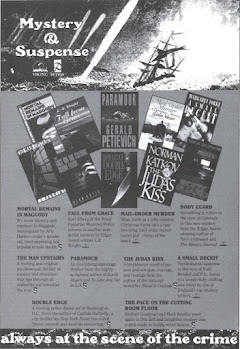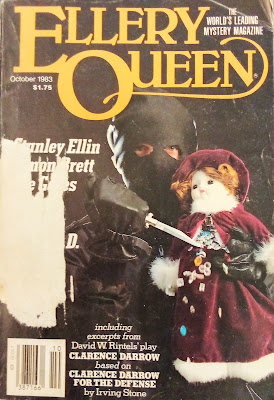|
Front
Sight Three Swagger Novellas by
Stephen Hunter Atria
Books, 2024 I read Stephen Hunter’s first Bob Lee Swagger
thriller, Point of Impact (1993), sometime during the Spring of 1994.
And holy wow, it knocked me off my feet with its disturbingly realistic
violence—the realism due as much to the emotional impact on the characters as
the action itself—and the dizzying large screen conspiracy plot with a former
Vietnam sniper, turned Arkansas drunk, nicknamed Bob the Nailer, at its core.
I read the next two—Black Light (1996) and Time to Hunt (1998)—as
they were released with the same satisfying awe as I’d had while reading the
first. Frankly, all three are among the best thrillers published in the 1990s. After that, Hunter switched
to telling the story of Bob Lee’s father, Earl. A rugged former Marine and
legendary Arkansas lawman gunned down in 1954 by the nasty Lamar Pye—you
should read the fantastic Dirty White Boys (1994) for Lamar’s tale. Hot
Springs, which was the first of three books featuring Earl—the
other two are Pale Horse Coming (2001) and Havana (2003)—hit
bookstores in 2000. And then in 2007 Hunter returned to Bob Lee with the disappointing
The 47th Samurai and again in 2008 with the so-so Night
of Thunder. Which is when I lost interest in Hunter’s new releases and the
Swaggers both. I mention all this
because I recently read Hunter’s Front Sight (2024), a collection of three
Swagger novellas—one each for Earl and Bob Lee, and another featuring Bob
Lee’s grandad, Charles Swagger—and found myself wondering if I’d been too
hasty in writing-off Hunter and the Swaggers. The first, “City of
Meat,” featuring Charles Swagger, is a hard-as-nails story about an elusive
drug syndicate working Chicago’s predominately Black 7th District in
1934. Charles is a former Arkansas sheriff and renowned gunfighter turned
G-Man on an FBI team looking for the notorious bank robber, Baby Face Nelson.
While investigating a possible sighting of Nelson at the Chicago Stockyards,
Charles is confronted by a knife-wielding man soaring high on an unknown
narcotic. Charles teams-up with the real-life depression-era Black lawman,
Slyvester Washington, nicknamed Two-Gun Pete—rumored to be the source material
for “Dirty Harry” Callahan in the Dirty Harry movies—and follows the
trail of the narcotics gang into unexpected places. “City of Meat” is action-packed
and violent, but its real-world setting, the plight of Blacks on Chicago’s
Southside—nobody really cared what happened there so long as it stayed
there—give it a panache and a depth unusual for anything published in the
thriller category. As Hunter says in his intro, “City of Meat” is his attempt
at writing the equivalent of “the message picture,” where the story is
accompanied by a portrayal of a societal ill. And it worked well. “Johnny Tuesday,” which
began life as an unproduced screenplay, is a hardboiled film noir in novella
format. It is hardboiled in a Carroll John Daly way: fast-paced but at times frustratingly
indecipherable with a black and white morality and, especially in the case of
Earl, cartoonish characters. It’s 1945 and Earl Swagger is fresh from the
South Pacific and now fighting a personal war in the small fictional city of
Chesterfield, Maryland. He hits town using the name Johnny Tuesday to
investigate a lethal bank robbery and finds pretty much everyone in town is a
scoundrel. The style of this one is
cool—it feels like one of those “complete novel” tales published in the pulps
of the 1930s. A category I like, but the writing (as good as it is) felt a
little too self-aware and the plot a little too busy. And even worse, Earl seemed
like an altogether different man than he is in his novels. “Johnny Tuesday”
would have worked better if the hero hadn’t been Earl Swagger, or if I hadn’t
read any of Hunter’s excellent Earl Swagger novels before reading it. “Five Dolls for the Gut
Hook,” which is my favorite of the stories, is a serial killer tale set in
Hot Springs, Arkansas. It’s 1979 and Bob Lee is drowning his dark Vietnam memories—“whiskey
dreams were the best, and this one was fine”—in his tiny Polk County,
Arkansas trailer. But his slow suicide gets shunted aside when his old friend
Sam Vincent comes asking for a favor. A killer is targeting young transient
women working Hot Springs’ sex trade and the local force is out of ideas of
how to catch the monster. They won’t go to the staties or the FBI because it
would bring unwanted publicity as Hot Springs is trying to transition from a
rough and tumble crime town into a family destination resort. And everyone is
sure Bob Lee can bring something new to the investigation since he comes from
lawman stock. And, of course, they’re right. In Hunter’s intro to “Five
Dolls for the Gut Hook,” he says it is his attempt at writing a “notorious
genre of bloody Italian mystery-horror films of the seventies,” called “Giallo.”
A film style I’m unfamiliar with, but if any of the films are as good as this
tale, I need to make amends and get acquainted with it quick-like. Besides
the great title, “Five Dolls of the Gut Hook,” has that grand dusty feeling of
the 1970s: pickup trucks, sweat, cowboy shirts, brutality, dark deeds, and corrupt
cops all wrapped into a honky-tonk town darkened by its many secrets. And
there’s Bob Lee, being Bob Lee, too. This one alone is worth the price of
admission. |
|
Check out Front
Sight on Amazon—click here for
the Kindle edition and here for
the paperback. |












